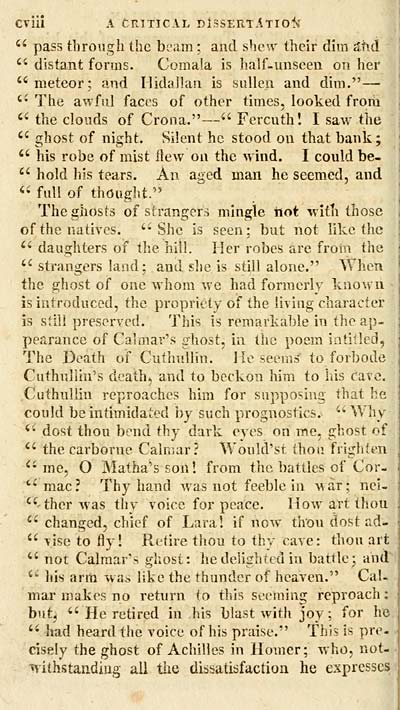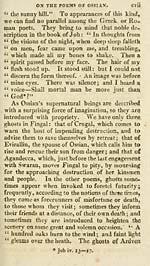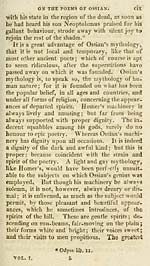Ossian Collection > Poems of Ossian > Volume 1
(126)
Download files
Complete book:
Individual page:
Thumbnail gallery: Grid view | List view

cviii A Critical dIssertAtio^'
'' pass tliroiigh the beam ; and show their dim &hd
'' distant forms. Comala is half-unseen on her
" meteor; and Hidallan is sullen and dim." —
'• The awful faces of other times, looked from
'' the clouds of Crona." — " FercuthI I saw the
" ghost of night. Silent he stood on that bank;
" his robe of mist flew on the wind. I could be-
" hold Ills tears. An aged man he seemed, and
«• full of thought."
The ghosts of stranger^ mingle iiot with those
of the natives. ''She is seen; but not like the
'' daughters of the hill. Her robes are from the
"■ strangers land ; and slie is still alone." When
the ghost of one whom we had formerly known -
is introduced, the propriety oif the living character
is still preserved. This is remarkable in the ap-
pearance of Calmar's ghost, in the poem intilled,
The Death of Cuthullin. He seema" to forbode .
Cuthullin's death, and to beckon him to his cave.
Cuthullin reproaches him for supposing that he
could be intimidated by such prognostics. '' Why
'• dost thou bend thy dark eyes on me, ghost of
^' the carborne Calmar? Would'st thou frighten
'- me, O Matha's soill from the battles of Cor-
'^ mac? Thy hand was not feeble in war; nei-
'' ther was thy voice for peace. How art thou
" changed, chief of Lara! if now thou dost ad-
" vise to fly! Retire thou to thy cave: thou art
" not Calraar's ghost: he delighted in battle; and^l
*'■ Ids arm was like the thunder of heaven." Cal-
mar makes no return to this seeming reproach :
but, ^' He retired in his blast with joy; for he:
'• had heard the voice of his praise." This is pre- J
cisely the ghost of Achilles in Homer; who, not-
^vithstandiug ail the dissatisfaction he expresses
'' pass tliroiigh the beam ; and show their dim &hd
'' distant forms. Comala is half-unseen on her
" meteor; and Hidallan is sullen and dim." —
'• The awful faces of other times, looked from
'' the clouds of Crona." — " FercuthI I saw the
" ghost of night. Silent he stood on that bank;
" his robe of mist flew on the wind. I could be-
" hold Ills tears. An aged man he seemed, and
«• full of thought."
The ghosts of stranger^ mingle iiot with those
of the natives. ''She is seen; but not like the
'' daughters of the hill. Her robes are from the
"■ strangers land ; and slie is still alone." When
the ghost of one whom we had formerly known -
is introduced, the propriety oif the living character
is still preserved. This is remarkable in the ap-
pearance of Calmar's ghost, in the poem intilled,
The Death of Cuthullin. He seema" to forbode .
Cuthullin's death, and to beckon him to his cave.
Cuthullin reproaches him for supposing that he
could be intimidated by such prognostics. '' Why
'• dost thou bend thy dark eyes on me, ghost of
^' the carborne Calmar? Would'st thou frighten
'- me, O Matha's soill from the battles of Cor-
'^ mac? Thy hand was not feeble in war; nei-
'' ther was thy voice for peace. How art thou
" changed, chief of Lara! if now thou dost ad-
" vise to fly! Retire thou to thy cave: thou art
" not Calraar's ghost: he delighted in battle; and^l
*'■ Ids arm was like the thunder of heaven." Cal-
mar makes no return to this seeming reproach :
but, ^' He retired in his blast with joy; for he:
'• had heard the voice of his praise." This is pre- J
cisely the ghost of Achilles in Homer; who, not-
^vithstandiug ail the dissatisfaction he expresses
Set display mode to: Large image | Transcription
Images and transcriptions on this page, including medium image downloads, may be used under the Creative Commons Attribution 4.0 International Licence unless otherwise stated. ![]()
| Early Gaelic Book Collections > Ossian Collection > Poems of Ossian > Volume 1 > (126) |
|---|
| Permanent URL | https://digital.nls.uk/77947702 |
|---|
| Shelfmark | Oss.79 |
|---|---|
| Additional NLS resources: | |
| Attribution and copyright: |
|
| Description | " ... to which are prefixed, 'Dissertations on the aera and poems of Ossian translated by James Macpherson'". |
|---|---|
| Shelfmark | Oss.79-80 |
| Additional NLS resources: | |
| Description | Selected books from the Ossian Collection of 327 volumes, originally assembled by J. Norman Methven of Perth. Different editions and translations of James MacPherson's epic poem 'Ossian', some with a map of the 'Kingdom of Connor'. Also secondary material relating to Ossianic poetry and the Ossian controversy. |
|---|
| Description | Selected items from five 'Special and Named Printed Collections'. Includes books in Gaelic and other Celtic languages, works about the Gaels, their languages, literature, culture and history. |
|---|

